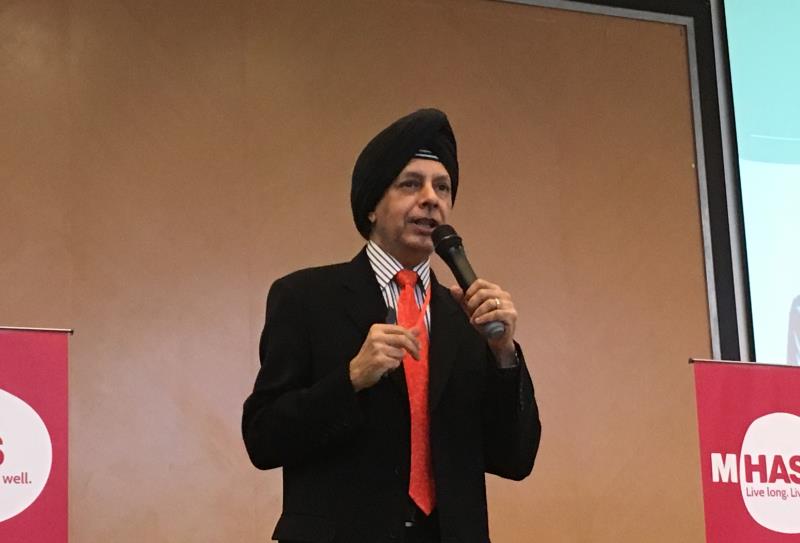 Dato’ Dr Rajbans Singh, consultant geriatrician, speaking at MHAS 2019.
Dato’ Dr Rajbans Singh, consultant geriatrician, speaking at MHAS 2019.Regardless of their field, healthcare professionals (HCPs) should engage with current research in nutritional medicine to assist patients seeking preventive solutions, says an expert.
“The supplement industry is booming now that patients armed with [the Internet] are increasingly trusting the numerous sources found on their own, rather than HCPs,” said Dato’ Dr Rajbans Singh, consultant geriatrician. “And the question is: are they right or wrong? … many in the medical profession, if asked about supplements by a patient, would by default say they are unnecessary. But to the patient, it can come across as a lack of knowledge, because they have read a lot that says otherwise.”
Speaking at the 9th Malaysian Conference on Healthy Ageing in Kuala Lumpur, Rajbans emphasized the need for other HCPs beside nutritionists and dietitians do their research into nutraceuticals to have nuanced and persuasive conversations with patients on the subject. With the growing costs of curative medicine worldwide, patients are increasingly looking at cheaper options that claim to offer prevention of illness, said Rajbans.
“There’s still no substitute for a healthy lifestyle and diet. However, some patients would rather take a pill than exercise and change their eating patterns, and others aren’t able to due to the demands of modern life,” said Rajbans.
Rajbans noted that older adults were particularly susceptible to inadequate micronutrient status, due to factors such as poor nutrition, reduced gastrointestinal absorption, altered metabolism, chronic disease, drug-induced deficiencies, low income, social factors, and/or inadequate nutritional knowledge. [JAMA 2002;287:3116–3126]
He argued for more acknowledgement of the role of multivitamin supplementation for the prevention of chronic disease in adults, citing a Harvard School of Public Health report that described daily multivitamins as ‘nutrition insurance’ with potential health benefits far outweighing the risks. [www.hsph.harvard.edu/nutritionsource/multivitamin]
Five key patient education points on supplement intake:
1) Supplements are not meant to replace a healthy nutritious diet and lifestyle, only to accompany them. The longest-lived communities in the world’s ‘blue zones’ take no supplements.
2) Supplements should be prescribed by someone with sufficient knowledge in the field of nutritional medicine. This is not necessarily limited to dietitians and nutritionists, but may be any other healthcare professionals who has done their research into the field through credible sources.
3) When consuming supplements, one must know why they are consuming it, as well as the correct dosage and duration it should be taken for.
4) Not all supplements are equal; as nutraceuticals are not subject to the same level of regulation as pharmaceuticals, one should seek reputable manufacturers and ensure the products contain the ingredients claimed.
5) Supplements must have studies of sufficient duration, quality and dosage before any claims—positive or negative—can be made about their properties. Unlike drugs, which show effects in less than 5 years, the benefits of supplements may take up to 20 years to be distinguishable. [Nutr J 2007;6:30]